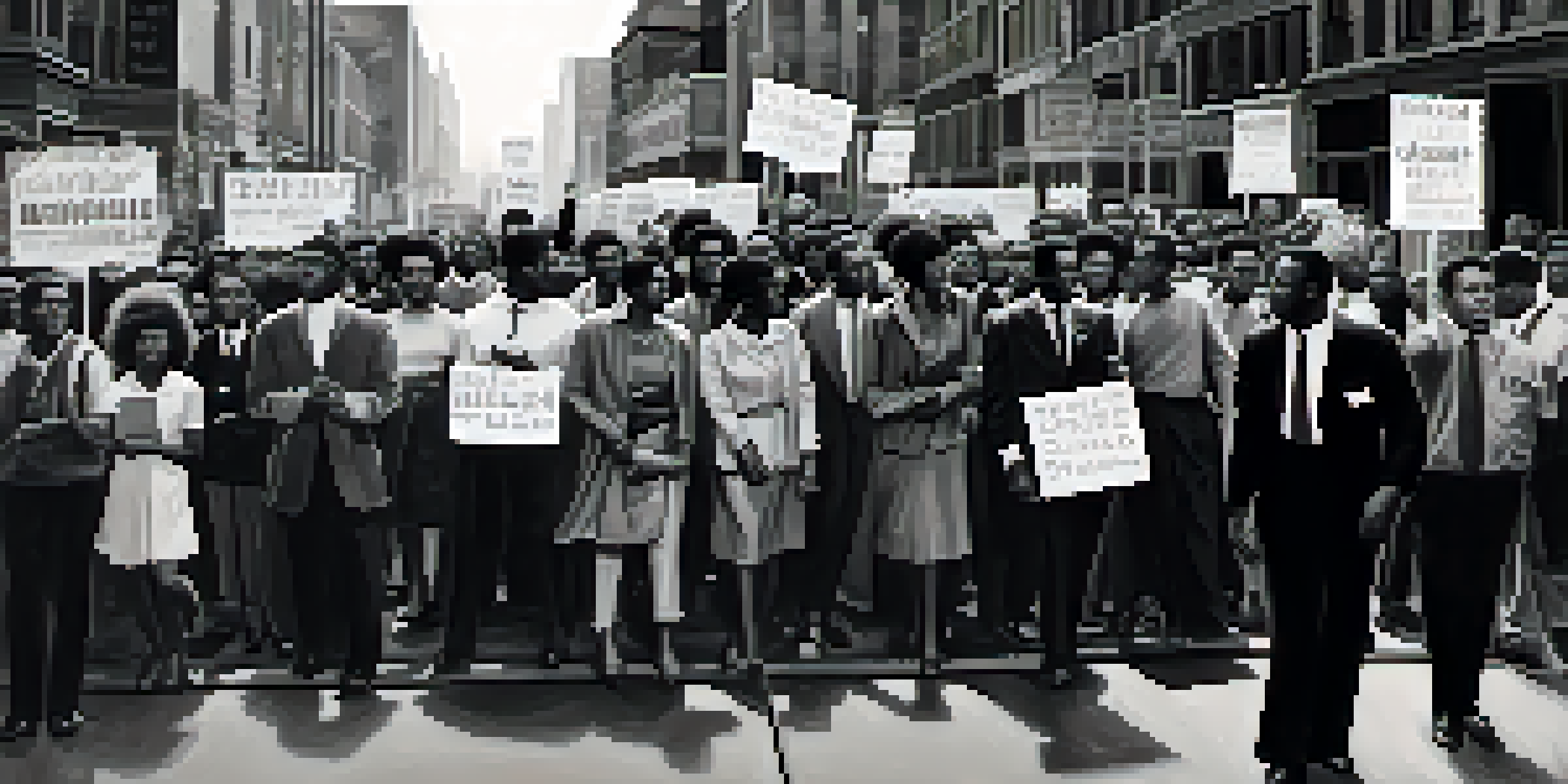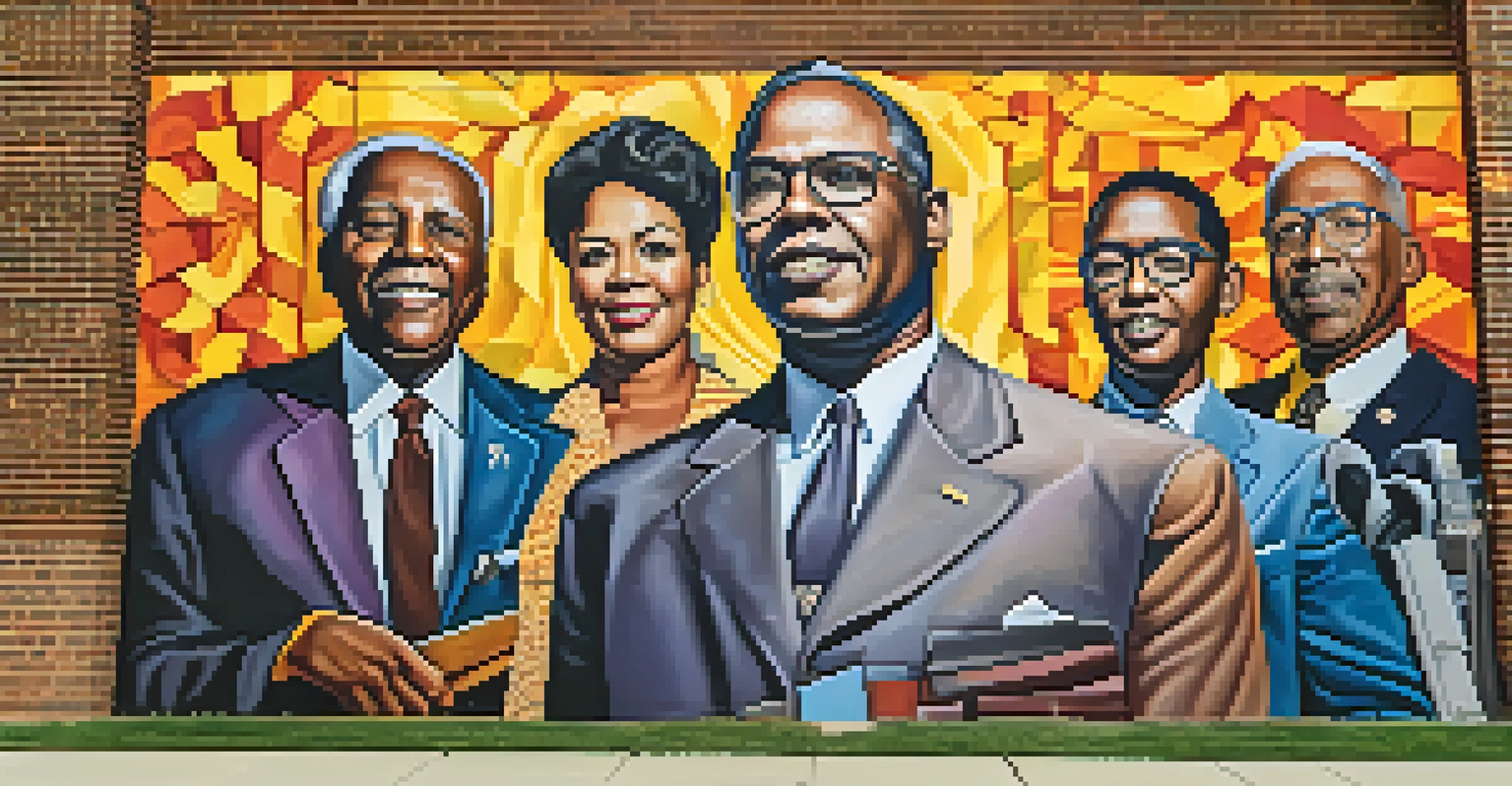Civil Rights Movement: Minneapolis' Role in Social Change

The Roots of Civil Rights in Minneapolis
Minneapolis has a rich history that intertwines with the broader narrative of the Civil Rights Movement. The city's diverse population, including a significant African American community, laid the groundwork for advocacy and social change. During the mid-20th century, local leaders began to address issues of segregation and discrimination, igniting a collective desire for equality.
Injustice anywhere is a threat to justice everywhere.
In the 1940s and 1950s, groups like the Minneapolis chapter of the National Association for the Advancement of Colored People (NAACP) emerged as influential voices. They organized protests and campaigns to challenge unjust laws and practices in housing, employment, and education. This grassroots activism was pivotal in fostering a culture of resistance against systemic racism.
The efforts of these early activists set the stage for more organized movements in the 1960s, as Minneapolis became a microcosm of the national struggle for civil rights. Their commitment to social justice not only impacted local policies but also inspired future generations to continue the fight.
Key Figures in Minneapolis Civil Rights Activism
Many notable figures emerged from Minneapolis, contributing significantly to civil rights activism. Leaders like Reverend Alonzo McDonald and activist Nellie Stone Johnson were instrumental in advocating for equality and justice. They brought together diverse communities to fight against racial injustices, serving as beacons of hope for many.

Reverend McDonald, in particular, played a vital role in organizing protests and rallies that focused on issues such as job discrimination and police brutality. His ability to galvanize support from various sectors of society showcased the power of unity in addressing systemic issues. Meanwhile, Johnson’s work in labor rights further highlighted the intersection of race and economic justice.
Minneapolis' Role in Civil Rights
Minneapolis played a pivotal role in the Civil Rights Movement, with local activists influencing strategies and reforms that impacted the national struggle for equality.
These individuals not only influenced local policies but also participated in national discussions, helping to shape the civil rights discourse. Their legacies remind us of the importance of grassroots leadership in effecting meaningful change.
Minneapolis and the Fight for Fair Housing
The fight for fair housing in Minneapolis was a critical aspect of the Civil Rights Movement. In the 1960s, discriminatory practices in housing were rampant, often forcing African Americans into segregated neighborhoods. Activists sought to challenge these injustices through protests and legal action aimed at securing equal access to housing.
The time is always right to do what is right.
The formation of groups like the Minneapolis Fair Housing Council highlighted the community's determination to combat discrimination. They organized campaigns to educate the public about housing rights and to advocate for policy changes. Their efforts culminated in the passing of fair housing laws, which were significant steps toward achieving equality.
This struggle not only transformed the housing landscape in Minneapolis but also served as a model for other cities grappling with similar issues. It underscored the importance of ensuring that everyone has a place to call home, regardless of race or background.
The Role of Education in Social Change
Education has always been a powerful tool for social change, and Minneapolis was no exception. Local activists recognized that equitable access to quality education was essential for empowering African American communities. Throughout the 1960s, efforts were made to address disparities in the educational system, which were often rooted in segregation.
Grassroots organizations worked tirelessly to advocate for desegregation in schools, aiming to create an inclusive environment for all students. These efforts included rallies, petitions, and collaboration with concerned parents and educators. The goal was to ensure that every child had the opportunity to succeed, regardless of their racial background.
Grassroots Activism for Housing Equity
The fight for fair housing in Minneapolis showcased the community's determination to combat discrimination, leading to significant policy changes that promoted equality.
The impact of these educational initiatives extended beyond the classroom, fostering a sense of community and collective identity. By emphasizing the importance of education, Minneapolis activists laid the groundwork for future generations to continue the fight for equality and social justice.
Minneapolis and the Labor Movement
The labor movement in Minneapolis was deeply intertwined with the Civil Rights Movement, as many activists recognized the connection between racial and economic justice. Unions played a crucial role in advocating for the rights of workers, particularly in industries that employed a significant number of African Americans. This solidarity helped to amplify the voices of marginalized communities.
In the 1960s, labor leaders began to confront issues of racial discrimination within their own ranks. They worked to create more inclusive workplaces, emphasizing the importance of diversity in union leadership and membership. This focus on equality not only improved conditions for African American workers but also strengthened the labor movement as a whole.
By highlighting the intersection of race and labor, Minneapolis became a hub for progressive activism. The collaborative efforts of labor unions and civil rights organizations demonstrated that the fight for equality extended beyond the ballot box and into the workplace.
Minneapolis' Legacy in the National Civil Rights Movement
The impact of Minneapolis on the national Civil Rights Movement cannot be overstated. The city emerged as a significant player in the struggle for social justice, with local activists influencing movements across the country. Their strategies and successes served as a blueprint for other cities facing similar challenges.
Minneapolis became known for its unique approach to advocacy, emphasizing collaboration among diverse groups. This model of intersectionality, where various forms of oppression are addressed simultaneously, was instrumental in shaping the broader civil rights discourse. The city’s activists taught others that unity was essential in the fight against systemic injustice.
Education as a Tool for Change
Activists in Minneapolis recognized the importance of equitable education in empowering African American communities, advocating for desegregation and inclusion in schools.
As the civil rights movement evolved, Minneapolis continued to be at the forefront, pushing for legislation and reforms that advanced equality. The enduring legacy of the city’s contributions serves as a reminder of the importance of local activism in driving national change.
Modern Implications of the Civil Rights Movement in Minneapolis
Today, the spirit of the Civil Rights Movement lives on in Minneapolis, influencing contemporary social justice initiatives. The struggles of past activists continue to resonate, reminding us that the fight for equality is far from over. Issues such as police reform and equitable access to resources remain pertinent, reflecting the ongoing challenges faced by marginalized communities.
Modern activists often look to the history of Minneapolis as inspiration, drawing lessons from the victories and setbacks of their predecessors. The city’s legacy of grassroots organizing serves as a powerful reminder of the impact that individuals can have when they come together for a common cause. This continuity of activism highlights the importance of learning from history to effect change today.

As Minneapolis confronts new challenges, the commitment to social justice remains strong. The lessons learned from the Civil Rights Movement continue to shape the city’s approach to building a more equitable future for all its residents.